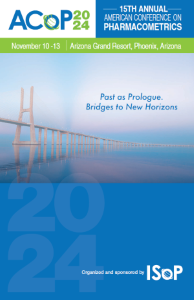Other
(W-031) Scientific Project Management (SPM) to Enhance Model-Informed Drug Development
Wednesday, November 13, 2024
7:00 AM - 1:45 PM MST
William Knebel, Pharm.D, Ph.D – President. Quantitative Sciences, Science, Metrum Research Group; Matthew Riggs, FISoP, Ph.D – Chief Science Officer, Science, Metrum Research Group; Bryon Baxter, NA – Senior Project Manager, Science, Metrum Research Group; Uchenna Emechebe, Ph.D – Scientific Project Manager, Science, MetrumResearch Group; Joseph Pliss, M.B.A – Director Project Management, Science, Metrum Research Group
- JF
Jeannine M. Fisher, M.S.
Scientific Project Manager
Metrum Research Group
Simsbury, Connecticut, United States
Author(s)
Disclosure(s):
Jeannine M. Fisher, M.S.: No financial relationships to disclose
Objectives: Often, application of quantitative techniques to inform drug development requires a multidisciplinary approach with input from data scientists, systems pharmacologists, clinicians, statisticians, and pharmacometricians, to name a few. Project leaders in this field represent a highly desired talent due to their technical expertise and ability to coordinate work in a multidisciplinary environment. Project management (PM) that imposes too much structure and strict task management offers little flexibility for scientific exploration or innovation and can stifle project flow and insight generation, especially in discovery-based projects[1]. Our objective was to refine the PM role in the scientific consulting space to optimize scientific insight, focus, and collaboration across disciplines while minimizing the distractions of administrative barriers inherent in the management of scope, schedule, and budget.
Methods: The role, skill set, and responsibilities of traditional project managers were reframed. The SPM role shifted away from a detailed task manager with rigid oversight of scope, schedule, and budget towards a consulting role on higher level tasks and dependencies, a greater role in external and internal communication and a partner with the scientific lead on project planning and risk assessment. Agile methods[2] of PM that originated in software development were adapted to the model-informed drug development consulting space. The SPM skills were expanded to include a service mindset, strong collaborative focus, and experience in a related scientific discipline to communicate strategically in the context of drug development. Responsibilities were also expanded to clearly communicate scientific discussions in meetings as an integral member of the project team, rather than as an adjacent administrative assistant.
Results: The SPM role was refined with a clearer understanding of PM needs in the field of quantitative drug development consultation. SPMs provided more valuable support to both the project and the scientists on the team. Task management detail receded to a more milestone focus. SPMs provided baseline PM tasks tailored to the needs of the project. Scientific insight resulted from better integration with the project team, allowing for earlier discussions on risk assessment and mitigation plans, particularly during the discovery phases of a project.
Conclusions: Prioritizing higher-level, strategic objectives, risk management, and team communication over detailed task management allows SPMs to provide more valuable support to a project. This shift allows more focused, insightful, collaborative work on the part of the scientists, while achieving project objectives in the drug development consulting space.
Citations: [1] Burgan, S. C. & Burgan, D. S. (2014). One size does not fit all: Choosing the right project approach. Paper presented at PMI® Global Congress 2014—North America, Phoenix, AZ. Newtown Square, PA: Project Management Institute.
[2] The Agile Manifesto https://agilemanifesto.org/principles.html

